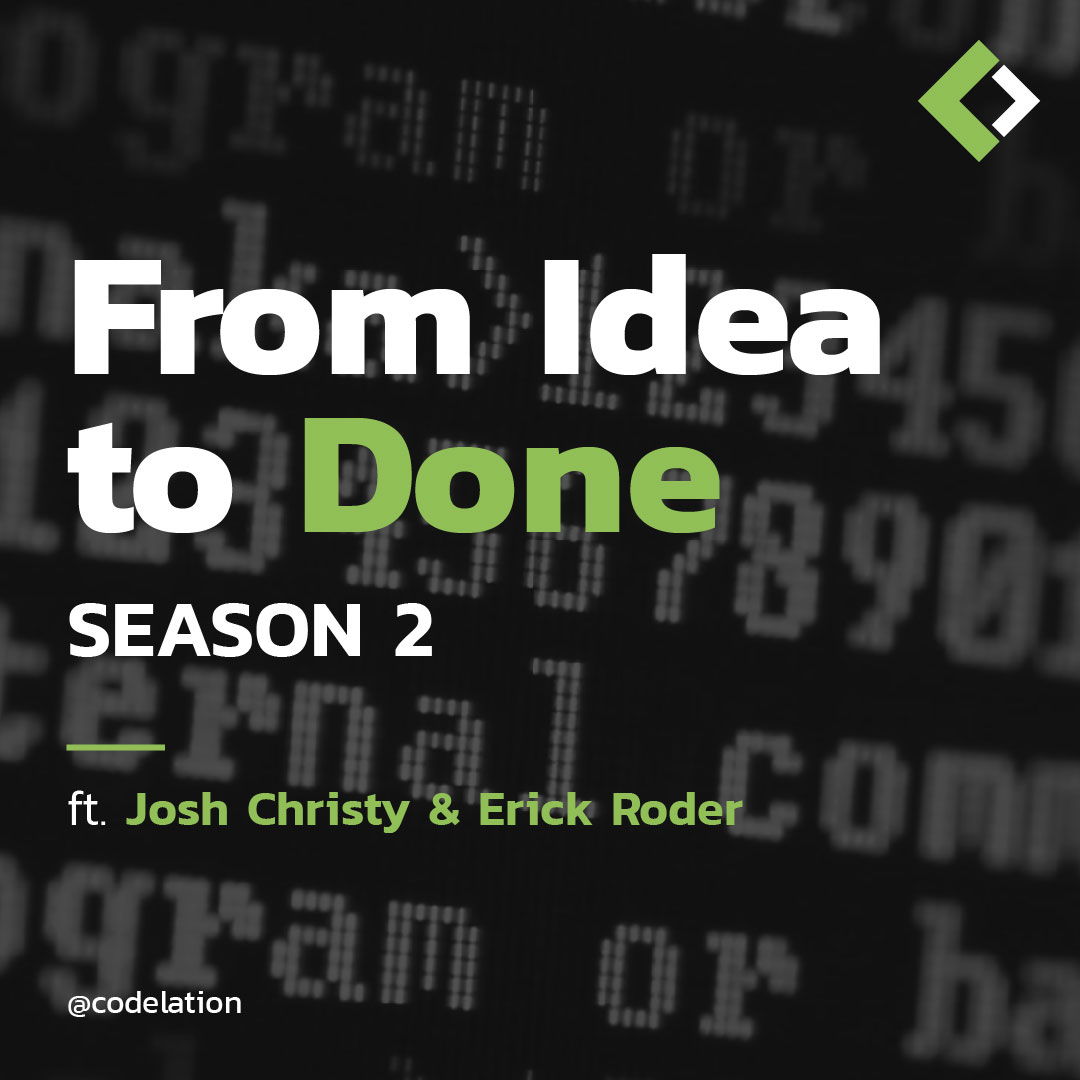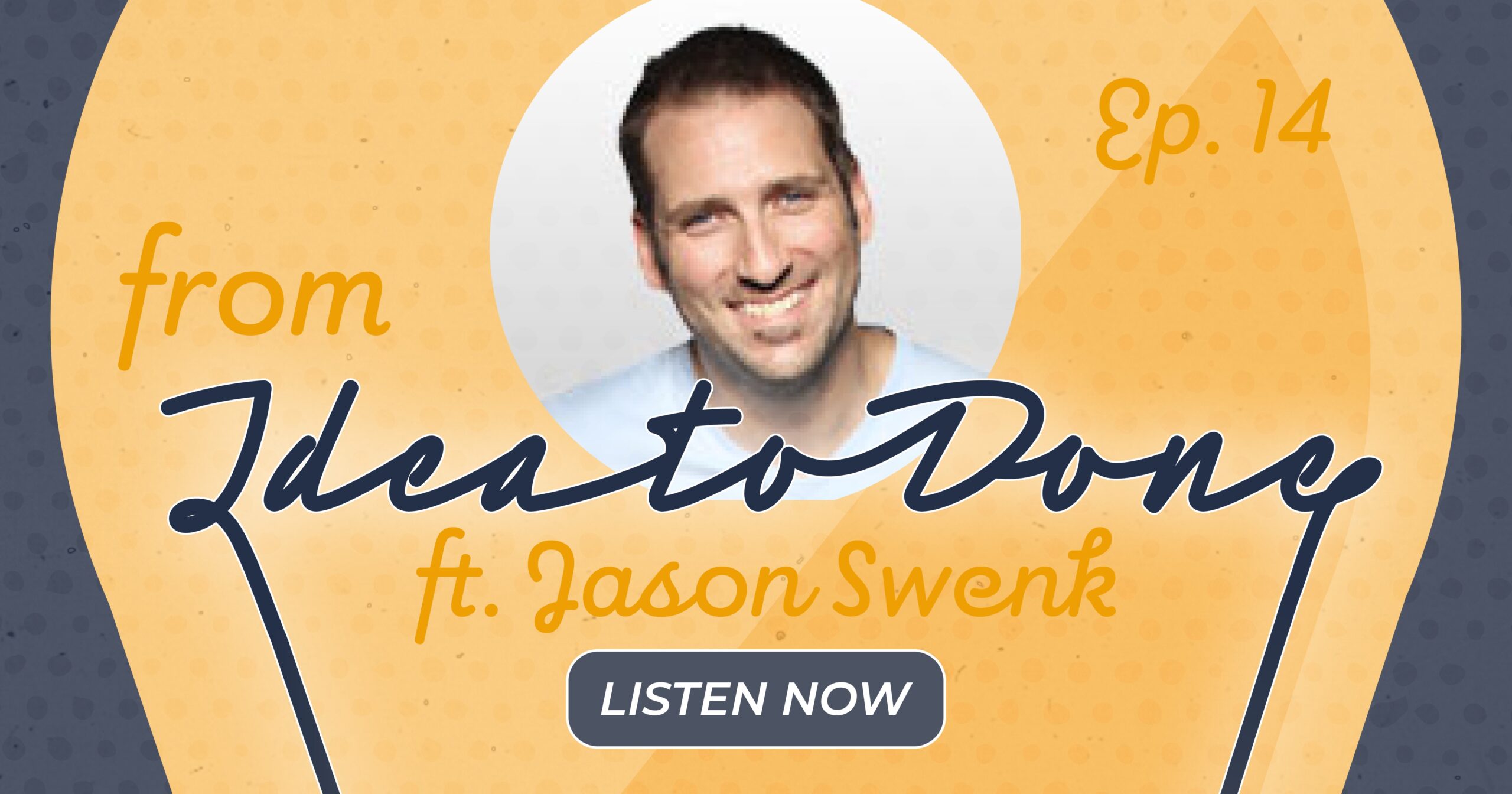Food Pics and Getting Traction ft. Jason Swenk

Nerdlympics
March 31, 2020
The World’s Largest Work from Home Experiment
April 14, 2020VO: Get ready for your semi-regular dose of random ideas from the guys at Codeelation. We like to talk about big ideas companies that are winning, and those that aren't along with current events in our crazy world of software startups. So come along with Erick and Josh, who challenge you to think big, start small and turn your ideas into something on this episode of, from idea to done.
Josh: Hi everyone. I'm Josh.
Erick: and I'm Erick.
Josh: And this is episode from idea to done. We have a special guest, Mr. Jason Swenk.
Erick: Jason, great. And thank you for being here
Jason Swenk: All already screwed up. Sorry.
Erick: Well, we got a solid 10 seconds and so that's our new records.
Jason Swenk: I always say, and I screwed up already. And so.
Erick: Swimming start Tuesday show, could you, could you just tell our audience a little bit about yourself, Jason? Yeah,
Jason Swenk: So, uh, Jason Swank, I'm a husband and father of, uh, two amazing, uh, boys that drive me absolutely crazy, which makes me an Uber driver, I think, really think about it. But, uh, you know, I started my career at Arthur Anderson as a computer programmer and then kind of was an accidental agency owner where we, you know, develop websites for legal zoom and Hitachi and Aflac and Lotus cars, and eventually grew it up to a really big agency and sold it. And now I'm a media company for agencies in market to them to help them figure out what do they need to do in order to grow and scale?
Josh: What, what size, uh, agencies do you like to work with?
Jason Swenk: Uh, seasonal- seasoned agencies with employees all the way up to about 25 million in revenue.
Josh: Okay. So pro proven they can do some proven they have traction in the market and you're just helping them build efficiencies
Jason Swenk: And scale. Exactly. Yeah. Outside the freelancer model, even though a lot of the content that we create for them, they would help them out. Um, but it's more designed for the season.
Josh: Absolutely. And we've, we've been following your podcast and a lot of stuff you put together. It's really, really good content. So if you haven't, if you haven't seen it yet, definitely go check it out. So the main reason we're talking here today is we wanted to kind of hear your take on launching a new, you know, mobile app, web app, and also validating a product before building it. So in 2020 here, Jason, how would you take an app to market with, you know, if you've got no audience, you're just getting something off the ground. What would you do?
Jason Swenk: Uh, I'm glad you asked that because I've actually, when I sold agency actually created an iPhone app and it fell, it failed miserably just because I didn't want to do it. Like I didn't believe in it, but I could tell you how I market it and how we actually started getting a lot of traction from it. Um, so it was an app that took pictures of everything that you ate and gave you a visualization. So you could do a food association. I got to a point where I was like, I don't want to take pictures of my, like, I was like, how can I, how can I market and sell this? Um,
Erick: White women
Jason Swenk: Yeah, that's true. But what I would do is, uh, I would go out to influencers, right. I would interview them. Um, and I would kind of get their opinions on, I mean, kind of what, what you're doing here.
Jason Swenk: Right. And get their opinion and see what they think. And then they'd be like, pass that on. Or we're creating content around that because when we were doing gold Vader, uh, I would go to the fitness individuals and say, look, do you have a hard time? And I would lead with something that they're struggling with. Do you have a hard time with your people that you manage or you try to help lose weight? Do you have a hard time with them food tracking? Well, here's a innovative app that just requires them to take pictures rather than write it down in a journal. And they were like, oh, that's cool idea. And so that's how we started growing. And it just kind of guerrilla marketing or guerrilla sales, you know, to do that.
Josh: Sure. Is, is the, has your opinion changed in 2020 or I guess when did you launch or when were you taking your app to market? Yeah,
Jason Swenk: Uh, 13, 2013.
Erick: It's been a while.
Jason Swenk: It's been awhile.
Erick: No, we both have like some Jedi gray in our beards.
Jason Swenk: This side is called Luke and this is called chase. Okay.
Speaker 5: Fair enough.
Speaker 3: So, yeah. Is there any different tactics that you would use today versus when you took that to product seven years ago?
Jason Swenk: Yeah, I would put a couple more on it. Like I would advertise do some pay-per-click and Facebook and Instagram, YouTube. Um, you know, just because I think you could get a lot of momentum, uh, you know, doing that as well.
Josh: Awesome. Um, you know, so we're, we're a software consultancy and we work with a lot of early stage kind of idea to MVP or minimum viable product is really our sweet spot. And whether that's, you know, two guys in a garage doing it, or it's an existing business that we're helping to monetize a new product line internally, uh, we found that people build something they shouldn't, because they're chasing the shiny object of the app. If I just have the app. How important do you think about sedating ideas before you start building before you start putting resources into it?
Jason Swenk: I think it's everything right. Like, I mean, I always tell, like everybody has ideas and they think it's like, when we were creating the gold Vader, you know, after I sold the agency, I was like Instagram sold for like a billion dollars or something like that, right. To Facebook. And I was like, oh, money's in where the apps pictures of food. I want to get to be like, this is like everybody eats and everybody likes taking pictures. So let's put these two together. And so I had the whole wrong intent. What I should have done is kind of like started going to people and be like, we like, and this was a free app to like, there was no business model behind it too. That's the funny thing. I was like pretty educated, but like, this was just a dumb move that I was doing. But if I was going to do it over again, I would, um, I would actually go to people and if they thought it was a good idea, I'd be like, all right, well give me $20 and then see if it, if it's still a good idea. Right? Yeah. And then like, if I got enough, then I would develop it.
Josh: Yup. Get a little skin in the game. So
Jason Swenk: Exactly. Everybody will always tell you, it's a brilliant idea. Like you should do it. Like you're going to be the next Zuck. Yup. You're the next suck. Yeah,
Josh: Just a few letters off. We had our friend Neil Patel on the podcast and he talked about launching with a freemium model as kind of a core piece to get distribution. Um, you know, given you had a, kind of a freemium app out there, would you have any thoughts on kind of how he positioned, you know, launch with freemium and then go into paid or, or something past that point?
Jason Swenk: Well, I mean, there's a thousand different ways to skin it. Right. And it just depends on the business model. Um, I mean, if you create a really good app, like, I can't tell you how many, like there's, um, there's an app on my phone that I use to scan in pictures because my printer, I always take a bat to it. Right. Like, it's like, why do they last for like a week? And then the office space and beat the out of it. So like, there's a scanner app that I use and it is a freemium model, but like I'll never pay for it. Like, I'm just like, right. Like, so I, I don't know how, like I would have to look at the numbers and look at that world, but I can tell you all the apps on my phone are all free. Yup. And maybe I'm just the cheap, but I think a lot of people were the majority then that's totally fair. So
Speaker 3: You don't go for it. Any, any kind of like closing thoughts on marketing or, you know, app building and in 2020 or,
Jason Swenk: Well, the biggest thing, right. With marketing or anything that you do, you have to know your audience better than they know themselves. And I think you need to do a couple of different things. A lot of people try to position that of like a, this, like check out this app rather than how does this app actually save people time. Right. And that's really what an app is really designed for or entertain them. I think those are kind of the two, I'm sure there's probably other ones, but those are the most important. So why don't you lead with that and saying, this app will save you time. This app will entertain you. Like I'm addicted to tick tock. Like I'm looking at dog and cat videos and stupid people doing stupid stuff and Jeep things and jumping off stuff. Like I'm like, this is awesome. But like with anything like markers always screw it up and someone will come up with some business advice on it and be like, just sucks. Next newest thing. So always lead with helping someone with entertaining them, making them more money or making them creating more time for them. Yeah. I think you'd be successful. What's the problem. Are we solving exactly? That's it? Yeah. And it's never about you. Like, if you ever positioned your app as like the, the star in someone else's story, it's never going to work. You've got to position them as like, this is, this is, uh, like a mechanism to get you to be the star.
Josh: Yeah. You're the hero in your story, right? Absolutely. Well, Jason takes, thanks for taking a little bit of time to chat with us today. Can you tell the audience, um, where you're, where are you located? Where can they come find you? How can they interact with you? And yeah.
Jason Swenk: Well, I'm not going to give you my street address. I know you, weren't asking that I'm just messing with you guys. Go to Jason swank.com. Swank is spelled SWE and case of Jason swank.com. We have a thousands of pieces of content from our multiple podcasts that we have in videos there. So go check it out and they will help you, uh, grow your business a little bit faster.
Josh: Awesome. Thank you. Thanks again for your time today.
Sign up to receive email updates
Enter your name and email address below and I'll send you periodic updates about the podcast.
